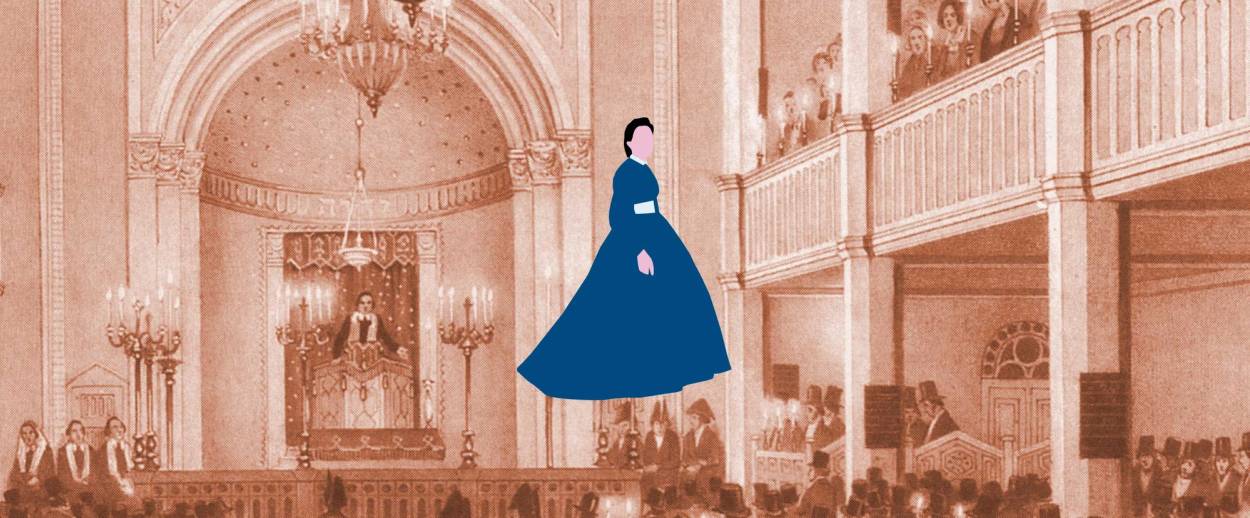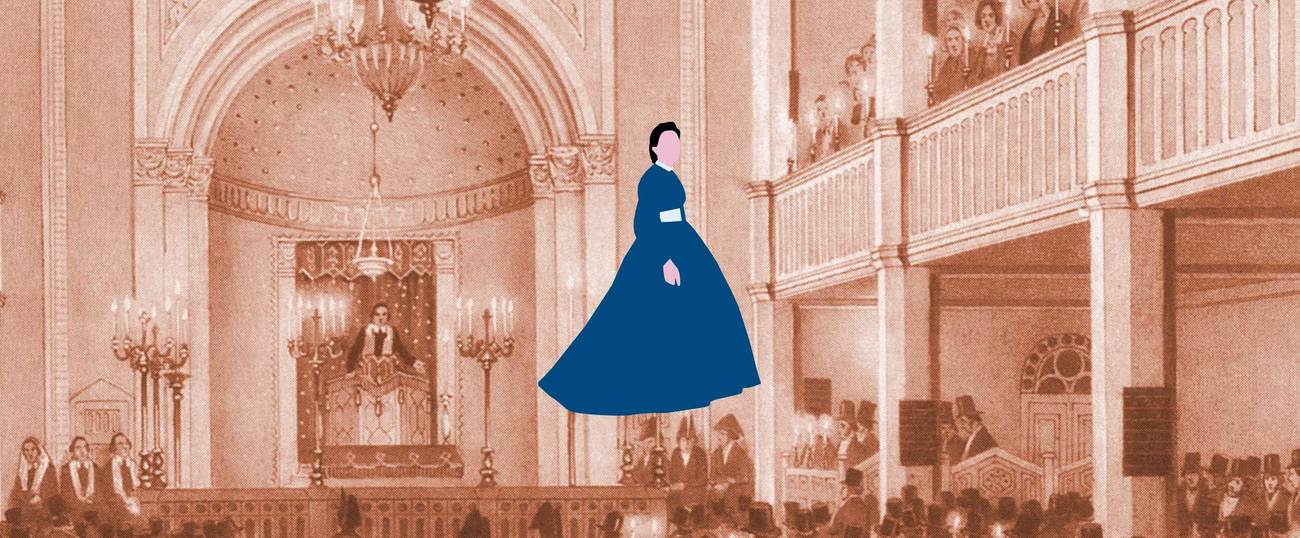Yom Kippur in Germany—Captured in an American Author’s Lost Novel
Published in 1860, Cora Wilburn’s groundbreaking book ‘Cosella Wayne’ was recently rediscovered by historian Jonathan D. Sarna, and is coming back into print




Cosella Wayne, published in 1860—the first novel written and published in English by an American Jewish woman writer, and the first coming-of-age novel to depict Jews in the United States—contains a memorable description of Yom Kippur as it was celebrated in Germany in the 1830s. Written by the forgotten author Cora Wilburn (1824-1906), born Henrietta Pulfermacher, Cosella Wayne recounts the story of its title character, who bears the same initials (C.W.) as the author herself. It appeared weekly in serial form in the American spiritualist journal Banner of Light, but never appeared as a book—until now. I discovered this lost novel while researching the life and work of Wilburn. The whole novel, with introduction, notes, and selections from Wilburn’s diary (which I was also fortunate enough to discover) is being published this month by the University of Alabama Press.
The novel opens upon a death scene. Lea, a Jewess, lies dying in childbirth in her parental home in England. Her regal Iberian-born mother, Hannah Montepesoa, quickly arranges for the surviving Jewish baby, whom Lea has named Cosella, to be abducted. The goal is to thwart what destiny seemingly demands: that Cosella be raised by Lea’s non-Jewish husband, Percival Wayne, a saintly Christian. While family members intimate to Percival that his wife and daughter have tragically died, Cosella is being abducted by the wicked Jewish gem merchant Manasseh Moshem and his long-suffering wife, Shina, (the western Yiddish pronunciation of the common Yiddish name Shayna). Manasseh proceeds to cart his little family around the world to escape Percival, who, having heard that his daughter yet lives, never abandons efforts to locate and recover her. England, Germany, Australia, India, Venezuela—the novel richly describes each location, as well as its Jews, including extraordinary ethnographic descriptions of Jewish rituals and sacred spaces. Almost uniquely for a 19th-century Jewish woman, the author Cora Wilburn knew each location firsthand thanks to her tempestuous upbringing and her parents’ roving lives.
In the following excerpt, Wilburn describes Yom Kippur as it was celebrated in Germany when she was young. She preserves the ancient custom of men wearing shrouds, also known as sargenesor a kittel, on the High Holidays. She also describes the practice of wearing a conical or pointed hat (Judenhut), one of many hats originally prescribed for Jews to wear and later taken on as a marker of identity and a symbol of tradition. Writing for the non-Jewish readers of Banner of Light, Wilburn describes Jewish rituals with unusual sympathy, especially when contrasted with 19th-century Christian accounts of Jewish holiday rituals. She pays particular attention to women, her principal readers, and, as if conscious of the prejudices of her day, offers reassurance that Jews “pray, too, for the earthly and Christian rulers set before them, for the prosperity of their adopted country, for the welfare of all.”
It is the great day of Atonement with the Jews. Clad in the habiliments of the grave, the sweeping shroud of linen, with its wide cape edged with lace, the conical cap upon their heads, the worshipers of the ancient law read the accustomed prayers and beat their breasts in penitence. The synagogue is thronged, the gilded chandelier dispenses its rays of artificial light to the broad glare of day, and the voice of the reader rises loud at intervals in the repetition of the sacred formula: “Hear, oh Israel! The Lord thy God, the Lord is One!” and the congregation fervently responded: “Blessed be his holy name forever and ever!”
Occasionally, the sweet, softly murmured chorus of female voices lends its charm to those antique hymns of praise and penitence. The women sit above, in a gallery devoted solely to their use, separated from husbands, fathers and brothers; some, the aged and the matronly, arrayed in the vestment that once shall shroud their lifeless forms; others, the young and gay, wear dresses of pure white, emblematic of the forgiveness of sins, the stainless purity of the day of expiation. Few wear their usual gay clothing; some retain their glittering jewels, their pearls and rings; but the truly pious divest themselves of all outward adornment, and stand in true humility before the Lord. It is a rigid fast day; neither meat nor drink has passed the lips of that prayerful throng since yesterday’s sunset; no refreshment will be taken until three stars illuminate the twilight depths of heaven. Israel offers this penance of the body, this humiliation of spirit by the confession of all sin, in place of the burnt offerings, the sacrifices of olden time.
They pray for the restoration of the land by them deemed holy; they weep afresh for the destruction of the sacred temple, for their scattered people and dethroned rulers. They strike their breasts, confessing their sins of commission and omission, and say aloud:
“For all this, oh Lord! King of the Universe grant us remission and pardon for thy name’s sake!”
Five times that day, the congregation fall upon their knees in worship to the unseen God, and implore his pardon for the people. They pray, too, for the earthly and Christian rulers set before them, for the prosperity of their adopted country, for the welfare of all.
Trembling with profound humility, with the consciousness of wrong, Shina offers up her supplications, and Cosella prays beside her from the same Hebrew page:
“For the sin we have committed before thee, by false dealing with the neighbor.”
Shina beats her breast, and thinks of the wronged Percival Wayne.
“For the sin we have committed before thee with lying lips!”
She weeps more bitterly, for she has stained her lips with falsehood for another’s sake. Cosella looks in wonderment upon the gentle face, with its penitential sorrow.
“Thou shalt make restitution!” was the injunction of the law she reverenced; but her spiritual perceptions were obscured; her weak, woman’s heart was not endowed with the moral purpose to atone and fulfill. The bold commanding intellect and powerful will of Manasseh bound and subdued her spirit; she felt the whisperings of conscience, the mandates of justice, but she dared not be free to act a noble part. She knew that her husband prayed for the repose of Lea’s spirit, as well as for that of her mother. From her woman’s soul ascended a prayer that was not written in her book of devotions, nor included in the formulas of that great day. She prayed for pardon of herself and husband, not only of the judging God, but of the wronged spirit of the Christian father. Amid the thrilling pathos of the supplicating hymn arose one petition unheard by all:
“Pardon for us sinners, spirit of Percival Wayne!”
All day Shina retained her place in the synagogue, and many praised the fervid piety of the lovely stranger, the graceful obedience of her pretty child. Manasseh called twice during the day for Cosella, but it required much persuasion to induce her to leave her mother’s side, even to go out to obtain some food; for it is not incumbent on children to observe the fast. Manasseh took the child to a neighboring restaurant, and placed before her such food as is permitted by the Jewish ordinances. But not a morsel passed his own lips. He then carried Cosella back to her place and took his station among the worshipers.
The September day drew to a close; the departing sunrays illumined the roofs and tree-tops; the evening prayer was begun; and the faint, hungry glances of the worldly minded turned to the slowly moving hands of the massive clock. The twilight deepened, and the last benediction was said; the horn of commemoration was blown twice to announce the consummated sacrifice; the return to worldly cares and duties. Pale and exhausted, much more with weeping and remorse than from want of food, Shina descended with the throng of matrons and maidens and waited at the entrance door for the appearance of Manasseh.
Deeply impressed with the beauty and solemnity of the religious exercises, Cosella was enwrapt in dreams, vague, wild, intangible, of the future and mysterious world.
Manasseh was deep in conversation with a countryman of his; he had just heard a name that caused his heart to bound with a fear that for some time had slumbered; the dark, avenging shadow would not flee from before him; one haunting name pursued him everywhere. Mastering his agitation by a powerful effort, compelling his voice to be firm and calm, he asked, indifferently:
“You say Mr. Wayne, a poet and a gentleman of leisure, passed through this city, this time last year? He was pleased with the synagogue—who could be less, with such a magnificent structure? Germany has the lead in appropriate places of worship for God’s chosen people, despite of the despotism of its rulers. But can you describe this Mr. Wayne? I knew a Wayne once—”
“He was tall and slender; very pale, with large expressive blue eyes, and light hair that waved rather than curled; his hands were very white and small; his manner high-bred. In short, he was what the people here call the picture of an English, my lord. He gave a handsome donation to the synagogue—a strange thing for a Christian to do; but he said he gave it for the sake of Lea. Not our father Jacob’s wife, I suppose.”
Manasseh turned aside his face. Too sure—too true; alas! Was fate in league against him? And the young Frenchman’s story—was that all false? Had Percival Wayne arisen from the tomb to haunt him; or was there another of that hated name? But the description was so complete—he was not buried beneath the fragrant sod of Italy; he lived yet to track the footsteps of his child!
Rage and disappointment, akin almost to madness, surged in the bosom of Manasseh; but it was revealed by no outward sign.
“Excuse me, sir; I must join my wife who I see is waiting for me yonder with my little girl,” he said politely to his companion, as he bowed and moved away.
It is customary for husbands and wives, friends and relatives, to embrace, in token of continued good-will and expiation of all wrong, on meeting after the close of the services of that great and holy day. As on the New Year, it is a time for reconciliation and forgiveness of all past enmities. Shina extended her hand with a loving, appealing smile. Her husband heeded her not; but bidding her take his arm, and leading Cosella by the hand, they passed the threshold of the house of prayer and silently took their homeward way.
Cora Wilburn (1824-1906), born Henrietta Pulfermacher, immigrated to the United States in 1848 and lived for the rest of her life in Philadelphia and around Boston. Her novels, essays and poems mostly appeared in rare Spiritualist journals and Jewish periodicals.